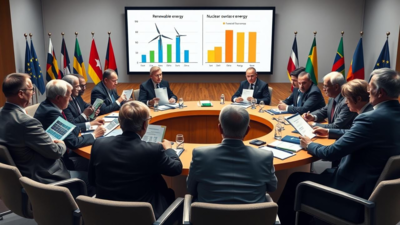
Representative Image (AI-generated)
It was only a relatively petty dispute over the organization of an EU event in Brussels. And yet, revealed how differently Economy Minister Katherina Reiche — of the conservative Christian Democratic Union (CDU) — and Environment Minister Carsten Schneider — of the center-left Social Democratic Party (SPD) — think about renewable energy, climate protection and nuclear power.In mid-June, Reiche was looking for a way to spend the evening in Brussels after a long meeting with her EU counterparts. There were two options: a meeting with representatives from countries that want to continue to expand renewable energies, and a meeting with pro-nuclear states.Twelve of the 27 EU states operate nuclear power plants, with France having the highest proportion — 55 reactors. Reiche ultimately attended the meeting of these countries, even though the government of former Chancellor Angela Merkel moved to phase out nuclear energy after the 2011 nuclear disaster in Fukushima, Japan.
Germany's last power plant went off the grid in spring 2023.Renewables or nuclear power?The fact that Reiche nevertheless chose to attend the meeting with the nuclear countries angered her SPD colleague. Schneider is officially responsible for nuclear safety in Germany as the environment minister, including issues relating to the interim and final storage of nuclear waste."We have decided to phase out nuclear power.
This has also been accepted by society," Schneider said.Officially, Germany is focusing on transitioning to renewable energies, and a large proportion of its energy is now generated from wind or solar power. "There are no further commitments [to the nuclear industry], nor will there be any," said Schneider.France, Germany backing all forms of energy: The disagreement between the Economy Ministry and the Environment Ministry on nuclear energy issues was already apparent.
At the end of May, Reiche said in Brussels that she was "open to all technologies" when it came to energy production.The specific trigger was a joint paper by the governments in Paris and Berlin, which stated that the energy policy in both countries would be implemented "based on climate neutrality, competitiveness and sovereignty." In other words, according to the wishes of German Chancellor Friedrich Merz and French President Emmanuel Macron, all forms of energy are to be promoted in the EU as long as they are low-emission.In France, this applies above all to the many nuclear power plants. In fact, nuclear power plants emit little or no greenhouse gases during operation and are therefore considered climate-friendly by their proponents.The dangers of the technology lie in controlling the nuclear chain reaction and the nuclear waste it produces, which remains radioactive for many thousands of years. According to the EU treaties, each member state has the right to choose its own energy mix.Major plans for new gas-fired power plants: There is also likely to be more disagreement between Reiche and Schneider on the issue of new gas-fired power plants.Shortly after taking office, the CDU minister announced plans to build 20 new gas-fired power plants. The previous government had also announced new construction to compensate for the often-fluctuating supplies from solar and wind power — but not in such large numbers.This is also a cause for concern for Schneider, who is responsible for meeting Germany's climate targets.
In mid-May, the German government's expert council on climate issues warned that the goal of becoming climate-neutral by 2045 must be backed up by a truly concrete plan from the government.A warning from climate experts: The economy and environment ministries have often clashed on issues of climate protection and energy policy. At the moment, the government's climate goals are being helped by the rather weak economy and the resulting lower production, especially in industry, according to the council. A member of the panel, Marc Oliver Bettzüge, director of the Institute of Energy Economics at the University of Cologne, told the newsmagazine Der Spiegel: "At this point in time, it is not clear how the federal government intends to achieve the goal of climate neutrality by 2045."Building new gas-fired power plants is likely to make this plan even more difficult. Although gas-fired power plants emit less greenhouse gases than coal-fired one

 5 hours ago
52
5 hours ago
52




























 English (US)
English (US)